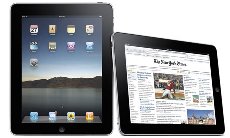Report: Apple Clinches Enterprise Deal With Unisys

Unisys will help Apple sell products such as the iPad and iPhone to large government and enterprise customers
Apple has signed a deal with Unisys to help boost its enterprise and government sales, according to a Monday report from Bloomberg.
The deal represents a renewed focus for Apple on large organisations, where it has a negligible presence, in spite of its success with consumers, which has bene underlined in recent events such as the launch of the new MacBook Air. Apple has argued it is making headway, in any case – the company said last week that the iPhone is being deployed or tested by 80 percent of Fortune 500 companies and that the iPad is being used or tested by 65 percent of Fortune 100 companies.
Business case
Industry observers have noted that Apple’s enterprise market is growing largely because of infiltration by popular devices such as the iPhone or, more recently, the iPad. Apple has more than 150 sales people devoted to enterprise customers, Gleacher & Co. analyst Brian Marshall told Bloomberg.
Unisys is to provide maintenance and other services for large organisations purchasing Apple devices, ensuring they work well with existing systems, Unisys managing partner Gene Zapfel told Bloomberg.
The contract was signed earlier in October, according to Zapfel, who didn’t disclose details
 Unisys has already created iPhone applications for US government clients, including one for the Department of Homeland Security allowing border patrol agents to remotely check the status of border monitoring technology. Zapfel said the company plans to build more government-oriented applications as part of the deal.
Unisys has already created iPhone applications for US government clients, including one for the Department of Homeland Security allowing border patrol agents to remotely check the status of border monitoring technology. Zapfel said the company plans to build more government-oriented applications as part of the deal.
A mobile device activation report from Good Technology earlier this month showed that Apple’s iPhone and iPad are being adopted by US consumers to help with their enterprise work, potentially threatening RIM’s dominance of the enterprise with its BlackBerry products.
The mobile messaging and device management software maker said devices based on Apple’s iOS accounted for 56 percent of net new activations in the US from June 2010 through September 2010.